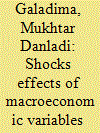|
|
|
Sort Order |
|
|
|
Items / Page
|
|
|
|
|
|
|
| Srl | Item |
| 1 |
ID:
183854


|
|
|
|
|
| Summary/Abstract |
The COVID-19 pandemic originated in Wuhan, China, in December 2019. The virus has spread across the globe over the last 20 months. In the interest of public health, the World Health Organization (WHO) has declared a public health emergency to harmonise international responses to the virus. In a strongly interconnected world, the effect of the pandemic goes beyond mortality and morbidity. The unprecedented outbreak of COVID-19 has also resulted in a global economic crisis. Almost every sector of the economy has been gravely affected by the pandemic to various degrees.
In an attempt to curb the spread of the virus many countries have initiated measures such as lockdowns, travel restrictions, ban on public and private transportation, closure of schools and colleges and restrictions on public and social gatherings. These initiatives have led to the decline in GDP, foreign trade and foreign exchange reserves, the rise of unemployment, the crash of stock markets and the depreciation of national currencies among other things.
|
|
|
|
|
|
|
|
|
|
|
|
|
|
|
|
| 2 |
ID:
179133


|
|
|
|
|
| Summary/Abstract |
This paper employs a five-variable monetary policy transmission model within a structural vector error correction (SVEC) modelling framework for Thailand to examine the relative contributions of the policy interest rate and a monetary aggregate of real output and prices. The model is estimated using quarterly data for the 2000Q2–2019Q4 period after imposing both short- and long-term restrictions. The empirical results suggest that the policy interest rate and the monetary aggregate contribute significantly to the forecast-error-variances of real output and prices, irrespective of whether the policy interest rate or the monetary aggregate appears to be the lead variable. That a shock to the money stock contributes to real output and to prices, whether treated as a policy instrument or as an endogenously determined variable within a generalized macroeconomic system, is consistent with the implication of classical monetary theory, which suggests the existence of a long-run equilibrium relation among money, real output, prices, interest rates and exchange rates. The results also support a co-integral relation among the four variables in Thailand. A major policy implication is that an inflation-targeting central bank such as the Bank of Thailand can deploy a monetary aggregate as a monetary policy instrument, particularly in a low inflation environment.
|
|
|
|
|
|
|
|
|
|
|
|
|
|
|
|
| 3 |
ID:
162926


|
|
|
|
|
| Summary/Abstract |
This paper has examined the transmission of shocks from macroeconomic variables, namely money supply, inflation, exchange rate and real GDP onto natural gas consumption using Structural VAR (SVAR) model with sign restrictions. The results revealed that both in the short run and long run, natural gas consumption responds significantly to the shocks emanating from money supply and real GDP while its response to inflation shock is significant only in the short run but exchange rate shock is not significant. However, money supply has contributed greater proportion of the shocks followed by the real GDP, inflation and exchange rate in the ordering of the variance decomposition. The paper recommends that Nigerian authorities adjust the monetary policy tools towards regulating the money supply and checking the inflation rate to ensure increased demand for natural gas and sustained economic growth. On the response of natural gas consumption to the shock in the exchange rate, since the shock is positive though insignificant, it implies that depreciation of the exchange rate can discourage the demand for foreign exchange, imports and, boost the local production which would reciprocally lead to more natural gas consumption and improved growth in the country.
|
|
|
|
|
|
|
|
|
|
|
|
|
|
|
|
|
|
|
|
|